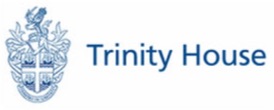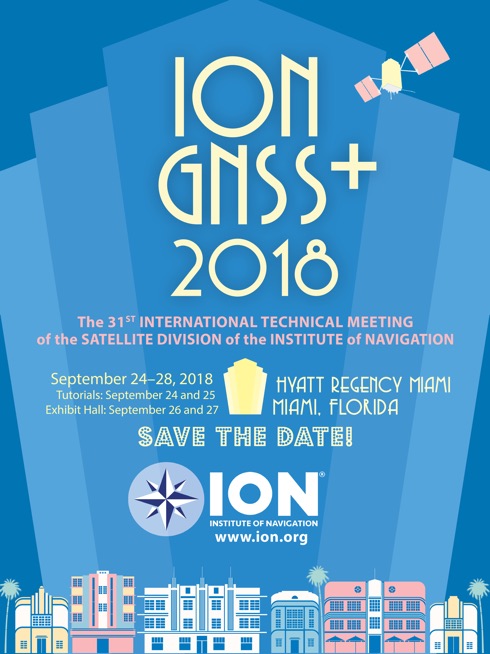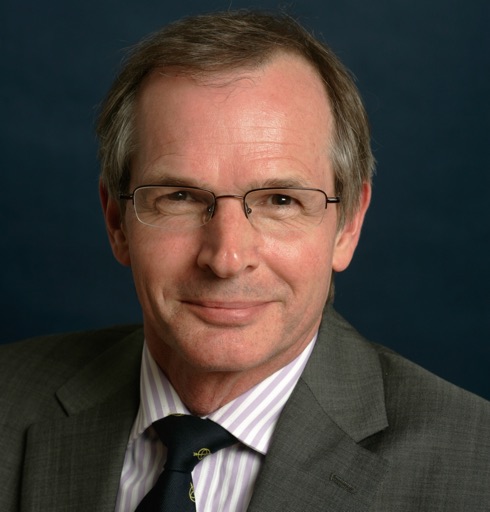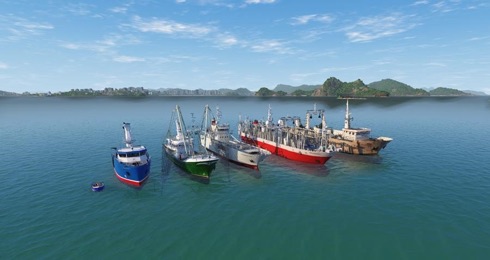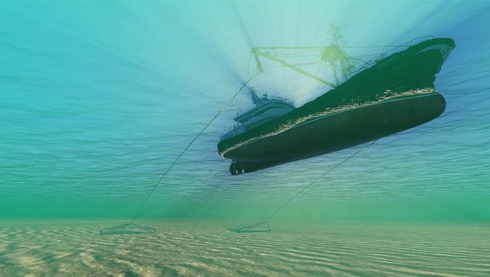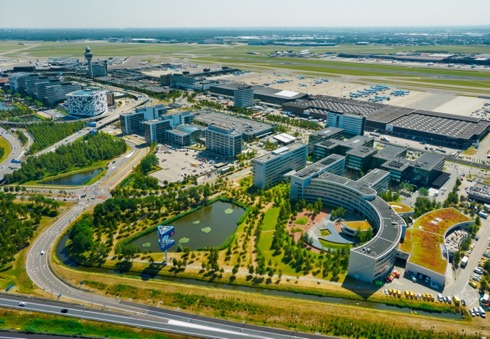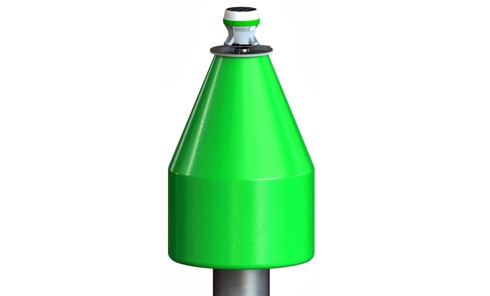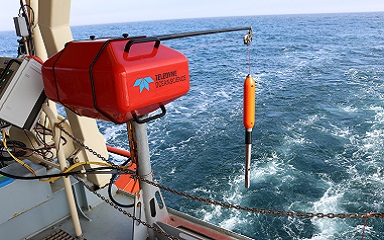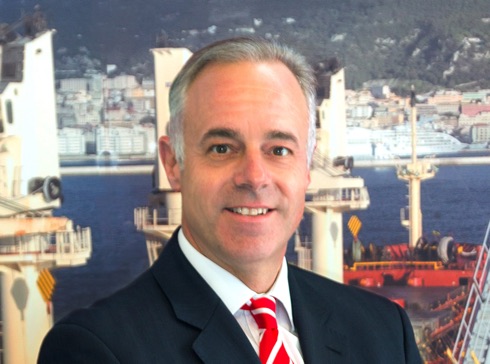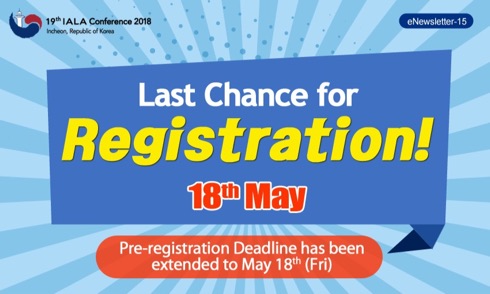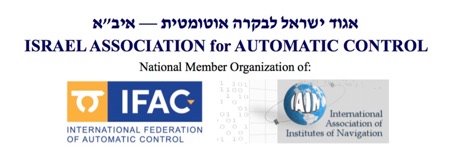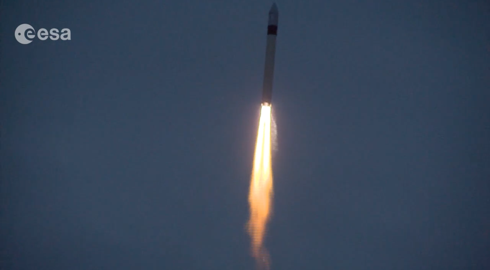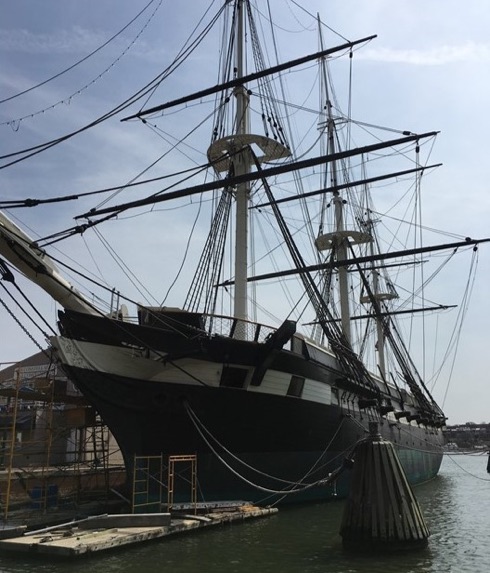Eid Mubarak
IAIN wishes Eid Mubarak to all our Muslim members and readers.
The 19th IALA Conference
More than 500 delegates attended the 19th IALA Conference in the port city of Incheon, Republic of Korea, from 26 May to 2 June 2018. A total of 94 technical presentations were made in 13 technical sessions and two special sessions over four days, and Conference participants were able to see and discuss the latest developments in aids to navigation and VTS technology in the large industrial exhibition, where a record number of IALA Industrial Members exhibited.
The Conference had a strong focus on the development and exchange of maritime digital information to improve the safety and efficiency of maritime transport. It heard that the use of Maritime Resource Names (.mrn) will be needed for the development of globally-harmonised data models to enable implementation of digital maritime services under the IMO e-Navigation Strategic Implementation Plan.
F-35s arrive in the UK


The first of Britain’s new advanced aircraft flew into RAF Marham their new home in Norfolk in eastern England. They touched down on the evening of 6 June after a trans-Atlantic flight from the United States, where Britain has more of the jets and 150 personnel in training. The F-35s took off from Marine Corps Air Station Beaufort earlier in the day, and were flown by British pilots of the newly-reformed 617 Squadron, which was immortalised by the famous Dambusters’ raid of the Second World War.
The F-35s’ arrival in the UK two months ahead of schedule provides an opportunity for support staff to get a head-start in preparing the aircraft ready for operational service at the end of this year.
Dassault Aviation pays tribute to Serge Dassault 1925-2018
Under Serge Dassault’s leadership, Dassault Aviation consistently developed and implemented a policy aimed at adapting to new market realities. He led the Company to rise to the challenges of the 21st century. Under his terms emerged innovative aircraft meeting the new customers’ requirements, notably the modernized Super-Étendard, the Mirages 2000-5 and 2000D and Rafale for combat aircraft, and the Falcons 2000, 900EX, 50EX, 900C and multi-mission Falcons with the Falcon family of business jets.
Under his impetus, and with the help of Charles Edelstenne, he restructured and modernized the industrial tool while maintaining the company’s social model. Notably, Serge Dassault ensured that every employee could benefit from the efforts made by distributing an incentive and a profit-sharing each year far in excess of what the law provided for.
Wider international cooperation on maritime digitalization and e-navigation
The Danish Maritime Authority widens the international work on digitalization and e-navigation and enters into a cooperation agreement with the Republic of Korea (ROK), Sweden, Australia and the People’s Republic of China (PRC).
This was reported by DMA from Seoul on 4 June. Up until this date Denmark has had cooperation agreements (MoU) on enavigation with the ROK and Sweden, but in order to strengthen the focus on digitalization in the maritime sector, the cooperation is now widened to include Australia and the PRC.
Congratulations
The President, Officers and member organisations congratulate Paul Ridgway, our association’s editor, on his being sworn in as a Younger Brother of Trinity House with effect from 1 May 2018.
ION GNSS+
ION GNSS+ is the world’s largest technical meeting and showcase of GNSS technology, products and services. This year’s conference will bring together international leaders in GNSS and related positioning, navigation and timing fields to present new research, introduce new technologies, discuss current policy, demonstrate products and exchange ideas.
ION GNSS+ 2018 will take place 24-28 September, 2018 at the Hyatt Regency Miami in Miami, Florida.
New President plots course for The Nautical Institute
The newly elected President of The Nautical Institute, Captain Nick Nash (illustrated) has pledged to help in its efforts to improve standards of shiphandling and bridge resource management (BRM). The election took place on 23 May.
Captain Nash is Senior Master for Carnival Corporation’s 144,000gt, 3650 passenger vessel Royal Princess. He also teaches at the group’s simulator training facility in Amsterdam, where he is a part-time lecturer on BRM and Shiphandling. The Institute has recently published a Shiphandling logbook aimed at providing users with an essential tool to help them manage the development of their skills and take advantage of training opportunities.
VSTEP introduces new fishing module
From Rotterdam on 28 May VSTEP announced the forthcoming release of its new NAUTIS fishing module simulator, enabling effective training in fishing vessels and allowing fishermen (under training) to strengthen their skills in catch scenarios. Trainees will be able to engage in all aspects such as searching, catching and handling of fish, while at the same time familiarising themselves with vessel manoeuvring.
It is reported that the NAUTIS Fishing Module will allow trainees to train in realistic scenarios and gain a better understanding of modern fishing methods. Trainees will be able to operate an array of fishing vessels, including a stern trawler, a long liner and jigging vessels. Ability to train purse seine, pelagic and pair trawling, long lining and jigging will also be included in the module. In this way, future fishermen will be better prepared to react in different environments and weather, it is understood.
Schiphol now a Collaborative Decision Making airport
The EUROCONTROL Network Manager has welcomed Amsterdam Schiphol Airport as the 28th full A-CDM (Airport – Collaborative Decision Making) airport. Amsterdam Schiphol is the last major hub airport in Europe to be connected to the Network Manager (NM) systems. It is also the first one to have used EUROCONTROL’s business-to-business (B2B) web services from the start. Now that Amsterdam Schiphol is fully A-CDM, the amount of traffic sending departure planning information (DPI) in the EUROCONTROL zone reaches 45%. NM is already working with a number of airports in anticipation of arriving at the 50% margin.
Congratulations have been sent by EUROCONTRTOL to colleagues at Schiphol Airport that have made a major effort to make this happen, working jointly with the operating airlines, LVNL and the EUROCONTROL NM team to make this happen.
ICAO concludes worldwide series of Safety Management Symposiums in Kigali, Rwanda

It was reported simultaneously from Montréal and Kigali on 22 May that ICAO is continuing its worldwide series of Regional Safety Management Symposiums and Workshops this time in Kigali, Rwanda. These gatherings promote the use of risk-based aviation safety approaches by ICAO Member States in the UN agency’s African Regions.
In the words of ICAO Council President Dr Olumuyiwa Benard Aliu: ‘We have embarked on this Safety Management Symposium in order to help ensure that your governments are ready and able to optimize the full socio-economic benefits of forecast air traffic growth, and to continue to develop safe, secure, efficient and sustainable aviation systems. No African country or economy should be left behind where this potential for future prosperity is concerned.’
Almarin at IALA Conference 2018
The International Association of Marine Aids to Navigation and Lighthouse Authorities (IALA) will hold its prestigious quadrennial IALA Conference from 27 May to 2 June in Incheon (Republic of Korea).
Almarin, an IALA industrial member, will exhibit and present its latest development in marine aids to navigation for the marking of rivers. This innovative buoy (illustrated), which works as a fixed and floating mark, is designed for rivers or channels with a large amplitude of water level variation while maintaining a high precision when water levels are low. It has been developed by Almarin in conjunction with the Port Authority of Douro e Leixões (APDL) and Instituto Hidrográfico de Portugal.
MSC news: Danish-Swedish routeing & Autonomous ships
On 21 May the Danish Maritime Authority (DMA) reported that the IMO Maritime Safety Committee (MSC) has approved a joint Danish-Swedish proposal for new ship routes in Kattegat and Skagerrak. It is understood that this work is already in progress and the new routes will be in place from 1 July 2020.
IMO has approved the new ship routes in Kattegat and Skagerrak following a proposal from Denmark and Sweden. This step is necessary due to the much larger size of ships navigating the straits today compared to the ships for which the route systems were originally designed.
News was received that when underway the MSC would be looking at how the safe, secure and environmentally sound operation of Maritime Autonomous Surface Ships (MASS) may be introduced in IMO instruments. Work in this session was expected to focus on the framework of the regulatory exercise (that is the instruments to be considered) and a plan of work, including expected deliverables, coordination mechanisms and future work. It is anticipated that a Working Group will be established to develop a plan of work and terms of reference for an intersessional correspondence or working group.
New CEO of the UK Chamber of Shipping
Commodore Bob Sanguinetti has been appointed Chief Executive of the UK Chamber of Shipping. He was until recently CEO of the Gibraltar Port Authority, where he was credited with delivering significant growth in vessel traffic following a series of wide-reaching initiatives. Previously he had served in the Royal Navy.
Sanguinetti said: ‘I am delighted to be appointed to this prestigious role at a time when shipping is so central to the political agenda. The UK Chamber team deserve great credit for their work in recent years, and I am determined that we build on the solid foundation created under Guy Platten’s leadership.’
Britain and France sign agreement for test pilot exchange
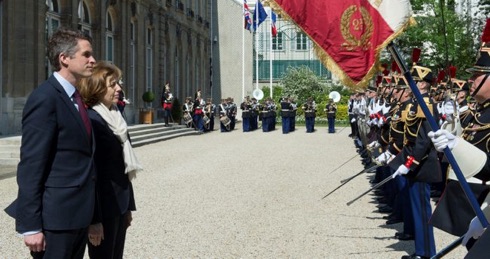
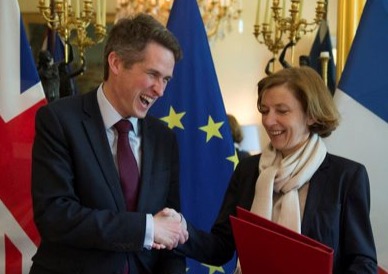
On 17 May Defence Secretary Gavin Williamson and French Minister of the Armed Forces Mme Florence Parly held the first Defence Ministerial Council since the announcement of a permanent and regular forum for the discussion of UK-France defence cooperation in January 2018.
During the meeting a bespoke technical arrangement which will oversee the exchange of test pilots between the two nations was signed. This agreement formalises an exchange enabling French pilots to train at the UK Empire Test Pilots’ School based at MOD Boscombe Down, and British pilots to train at the French Test Pilots’ School, Ecole du Personnel Navigant d’Essais et de Reception on the Istres Le Tube airbase.
19th IALA Conference pre-registration
The 19th IALA Conference Secretariat has extended the pre-registration period to the 18th of May 2018.
IAAC guest workshop: Modern Gain-Scheduling by Convex Optimization
Professor Moshe Idan, IAAC President, reports that this event will be held on 21 May, in the Daniel Hotel, Herzelia. The workshop will be delivered by Professor Carsten W Scherer from University of Stuttgart, Germany, and will be supplemented by a lecture by Dr Maxim Kristalny from Rafael-ADA.
For more details and the registration form readers are invited to visit http://iaac.technion.ac.il
MUAC implements additional sectors in Netherlands airspace
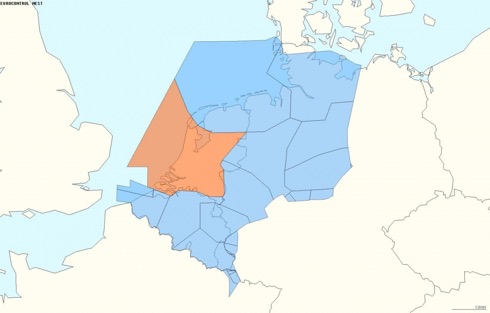
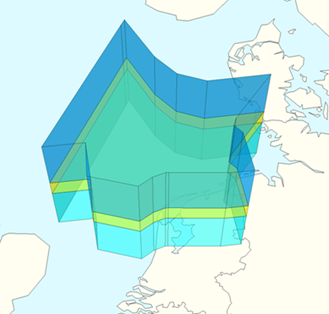
It was announced at the end of April that EUROCONTROL’s Maastricht Upper Area Control Centre (MUAC) had implemented a third vertical sector layer in the western part of its airspace, in The Netherlands. The purpose of this airspace redesign is to increase capacity in the Delta sector by creating new sector configurations based on three layers instead of the previous two.
The three layers consist of a low sector (from flight level 245 to 335 [that is 24,500-33,500ft]), a middle sector (from flight level 335 to 365 [33,500-36,500ft]) and a high sector (extending from flight level 365 to 660 [36,500-66,000ft]). This new vertical division allows for a better distribution of workload in the Delta sector and thus ensures a safer and more sustainable service, it is reported by EUROCONTROL.
UK Space Agency leads work on options for an independent satellite system

According to a recent statement the UK Space Agency will lead work to develop options for a British Global Navigation Satellite System. This was confirmed by the Government on 2 May as it develops options for a British Global Navigation Satellite System.
It is reported that the UK is already a world-leader in developing atellite technology, building 40% of the world’s small satellites and one in four commercial telecommunications satellites. Down the years UK companies have made a critical contribution to the EU Galileo programme, building the payloads for the satellites and developing security systems. The taskforce will draw on this experience and expertise as it develops plans for an innovative system that could deliver on the UK’s security needs and provide commercial services.
The recent Blackett review estimated that a failure of navigation satellite service could cost the UK economy £1 billion a day. Resilient and secure positioning, navigation and timing information is increasingly essential for defence, critical national infrastructure and emergency response.
US 2nd Fleet to be established
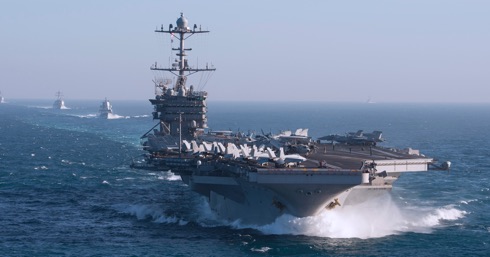
It was reported from Norfolk, Virginia, on 4 May that Chief of Naval Operations, Admiral John Richardson, had announced that day the establishment of US 2nd Fleet during a change of command ceremony for US Fleet Forces Command (USFF) in Norfolk.
Second Fleet will exercise operational and administrative authorities over assigned ships, aircraft and landing forces on the East Coast and northern Atlantic Ocean. Additionally, it will plan and conduct maritime, joint and combined operations and will train, certify and provide maritime forces to respond to global contingencies. Commander, 2nd Fleet will report to USFF.
Asia-Pacific e-Navigation underway
Take a look at the tentative schedule and programme.
And the registration page.
ESA Sentinel-3B liftoff
The second Copernicus Sentinel-3 satellite, Sentinel-3B, lifted off on a Rockot from the Plesetsk Cosmodrome in northern Russia at 1757 GMT (1957 CEST) on 25 April.
Sentinel-3B joins its twin, Sentinel-3A, in orbit. The pairing of identical satellites provides the best coverage and data delivery for Europe’s Copernicus programme – the largest environmental monitoring programme in the world.
These satellites carry the same suite of advanced instruments to measure oceans, land, ice and atmosphere. While these data are fed primarily into the Copernicus Marine Environment Monitoring Service, all the Copernicus services benefit to produce knowledge and information products in near-real time for a wide range of applications.
19th IALA Conference, Korea
Check the latest programme.
Beyond GNSS – UK Efforts to Combat PNT Vulnerability
News has been received of the RNT Foundation Reception and Annual Meeting in USS Constellation in Baltimore’s Inner Harbor.
The evening includes:
– Guided tours of the USS Constellation, built 1854;
– Reception with heavy hors d’oeuvres, wine, and beer;
– Special Presentation: Beyond GNSS-UK Efforts to Combat PNT Vulnerability-2018 by Professor David Last.
Professor Last will be speaking about the 2018 Blackett Review about dependencies on satellite derived time and position, the 2017 London Economics report about the cost of disruption of GNSS services, the new MarRINav project, and other steps the UK is taking to eliminate GNSS as a single point of failure for their national economy and security.
Modern Gain-Scheduling by Convex Optimization

This event will be held on 21 May 2018, in the Daniel Hotel, Herzelia, Israel.
The workshop will be delivered by Prof Carsten W Scherer from University of Stuttgart, and will be supplemented by a lecture from Dr Maxim Kristalny from Rafael-ADA.
An early registration discount is offered up to 13 May.




